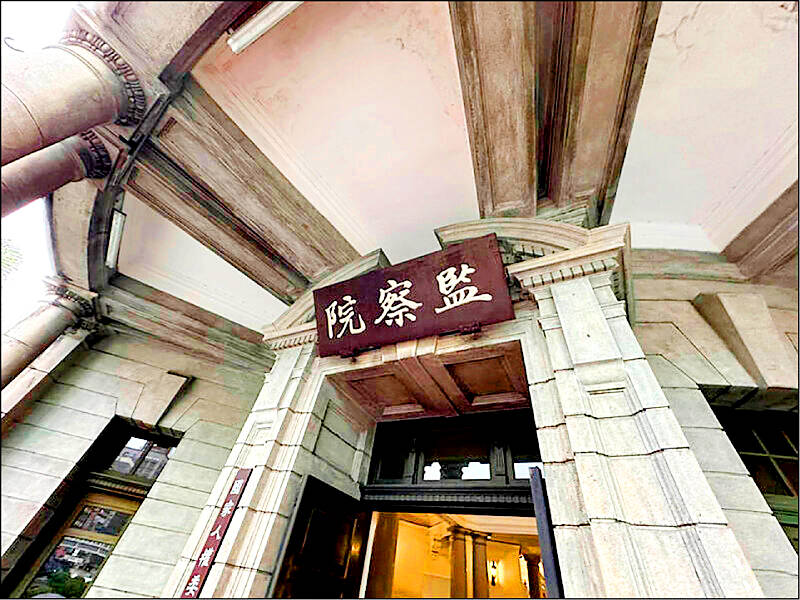Telecommunications fraud is a national security threat that poses a significant risk of harming Taiwanese lives and property, the Control Yuan said yesterday as it called on the government to step up a campaign against scammers.
Taiwanese law enforcement has reported 20,000 domestic cases of telecom fraud this year, marking a historic high despite the implementation of the anti-fraud action plan versions 1.0 and 1.5, it said in a news release.
The soaring rate of fraud is worrisome and suggests underlying weaknesses in the government’s approach to regulating telephone number registrations, digital platforms and cryptocurrencies, it said.

Photo: Taipei Times
The Cabinet should monitor and improve anti-fraud programs, especially with regard to using preventive measures and boosting effectiveness, the Control Yuan said.
Although the government’s public information campaign involving 16 agencies has supposedly been heard, read or seen 330 million times, repeated exposure is not an indication of success, it said.
Public-private partnerships and an evidence-based approach should guide the government’s policy going forward, it said, adding that cooperation with businesses, civic and religious groups, and community organizations is crucial to efforts to combat fraud.
The government’s claimed success in preventing fraudsters from accessing telecom services should be treated with skepticism, as one alleged scammer in a recent case obtained the use of 300,000 phone numbers, it said.
The Control Yuan urged regulators to strengthen the government’s collaboration with telecom service providers to detect or prevent fraud at the source.
Telecom data should be more closely monitored, it said.
It also recommended the government use artificial intelligence (AI) technology to detect fraudulent advertisements, adding that efforts to remove ads have not achieved notable results.
Regulators should consider creating a social media fraud safety assessment system to provide objective metrics for gauging the success or failure of the measures, it said.
Laws and regulations concerning third-party transferable virtual accounts and cryptocurrency wallets should be shored up to prevent their use by scammers, the Control Yuan said.
The latest amendments to the Code of Criminal Procedure (刑事訴訟法) authorizing law enforcement to make use of cell-site simulators and GPS trackers to locate suspects is a positive development, it said.
However, the government should anticipate the application of AI and deepfake technology for crime by taking appropriate measures, it said, adding that partnerships with foreign governments might be required to tackle the issue.
The Control Yuan said that it had submitted its investigative report on countering telecom fraud to the Executive Yuan for its consideration.

SHIPS, TRAINS AND AUTOMOBILES: The ministry has announced changes to varied transportation industries taking effect soon, with a number of effects for passengers Beginning next month, the post office is canceling signature upon delivery and written inquiry services for international registered small packets in accordance with the new policy of the Universal Postal Union, the Ministry of Transportation and Communications said yesterday. The new policy does not apply to packets that are to be delivered to China, the ministry said. Senders of international registered small packets would receive a NT$10 rebate on postage if the packets are sent from Jan. 1 to March 31, it added. The ministry said that three other policies are also scheduled to take effect next month. International cruise ship operators

HORROR STORIES: One victim recounted not realizing they had been stabbed and seeing people bleeding, while another recalled breaking down in tears after fleeing A man on Friday died after he tried to fight the knife-wielding suspect who went on a stabbing spree near two of Taipei’s busiest metro stations, Taipei Mayor Chiang Wan-an (蔣萬安) said. The 57-year-old man, identified by his family name, Yu (余), encountered the suspect at Exit M7 of Taipei Main Station and immediately tried to stop him, but was fatally wounded and later died, Chiang said, calling the incident “heartbreaking.” Yu’s family would receive at least NT$5 million (US$158,584) in compensation through the Taipei Rapid Transit Corp’s (TRTC) insurance coverage, he said after convening an emergency security response meeting yesterday morning. National

The Forestry and Nature Conservation Agency yesterday launched a gift box to market honey “certified by a Formosan black bear” in appreciation of a beekeeper’s amicable interaction with a honey-thieving bear. Beekeeper Chih Ming-chen (池明鎮) in January inspected his bee farm in Hualien County’s Jhuosi Township (卓溪) and found that more than 20 beehives had been destroyed and many hives were eaten, with bear droppings and paw prints near the destroyed hives, the agency said. Chih returned to the farm to move the remaining beehives away that evening when he encountered a Formosan black bear only 20m away, the agency said. The bear

PLANNED: The suspect visited the crime scene before the killings, seeking information on how to access the roof, and had extensively researched a 2014 stabbing incident The suspect in a stabbing attack that killed three people and injured 11 in Taipei on Friday had planned the assault and set fires at other locations earlier in the day, law enforcement officials said yesterday. National Police Agency (NPA) Director-General Chang Jung-hsin (張榮興) said the suspect, a 27-year-old man named Chang Wen (張文), began the attacks at 3:40pm, first setting off smoke bombs on a road, damaging cars and motorbikes. Earlier, Chang Wen set fire to a rental room where he was staying on Gongyuan Road in Zhongzheng District (中正), Chang Jung-hsin said. The suspect later threw smoke grenades near two exits